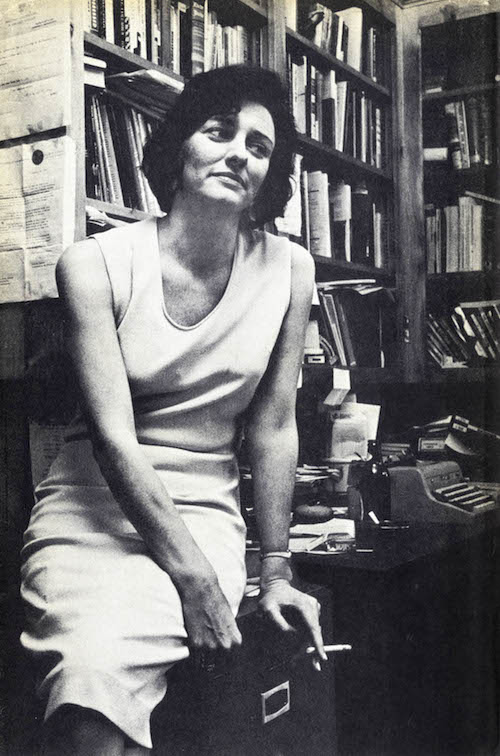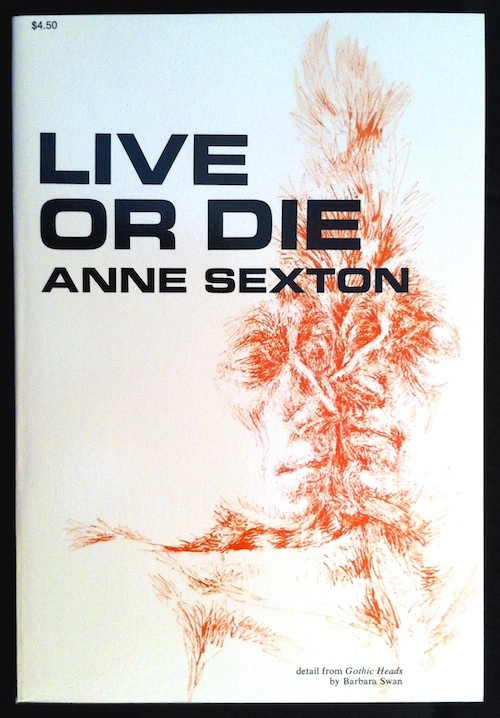How Anne Sexton Won the Pulitzer Prize
If you happen to have a spare $159.60 you don’t know what to do with, you might want to consider purchasing Chronicle of the Pulitzer Prizes for Poetry (available on Amazon.com). It makes for some mighty interesting reading: the inside scoop on that most cherished of poetry prizes. The book covers the period between 1917, when the award began, and 2009. We learn who the jurors were each year, which titles they seriously discussed, and why they chose the winners they chose. Some years have more documentation than others, but there’s enough fascinating information here to justify the expenditure: a candid, often bewildering glimpse into the inner-workings of poetry politics.
I bought the book because I was interested to know how Anne Sexton, one of my favorite poets, came to win the Pulitzer Prize. She won it for Live or Die, her third book, in 1967. Let me share with you what I found out. The three jurors that year were Richard Eberhart, Phyllis McGinley, and Louis Simpson. Everyone is familiar with their work, right? All Pulitzer winners. On December 2, 1966, John Hohenberg, Secretary to the Advisory Board on the Pulitzer Prizes, wrote to Eberhart, who’d won the Pulitzer the previous year, appointing him chairman of the committee and asking that he notify him of the committee’s decision by December 31. It would take much longer than that. A decision would not be reached until the end of March—three months overdue. Deliberations, carried out via letters between the jurors, were contentious; the committee ultimately came to a stalemate.
If this were an essay, I would tell the story in all its glorious detail—it’s a great story. But this is a blog post, so I will try (wish me luck) to be succinct. Out of roughly forty books, McGinley’s first choice was Theodore Roethke’s posthumous Collected Poems. She also expressed interest in Anne Sexton’s Live or Die, Philip Booth’s Weathers and Edges, and Sylvia Plath’s Ariel (also a posthumous collection), though she did not think it was “the masterpiece the reviewers—carried away, no doubt, by her frenetic life—have called it.” Eberhart’s top choice was John Hall Wheelock’s Dear Men and Women. He admired it, in part, because it was “a splendid achievement of a man of 80. He will never be any younger.” McGinley also singled out Wheelock; she was “touched” by his work, “old-fashioned as it is.” Simpson, like McGinley, chose Roethke as his first choice. He was also for Plath: “I do think that the book is original in its use of images and has unusual intensity.” But against Booth: “I am considerably worried,” he wrote to McGinley and Eberhart, “by your preference for Phillip [sic] Booth.”

All the cards were on the table. The contest might have ended there: 2 to 1 in favor of Roethke. But Eberhart would not have it. He was adamantly opposed to giving the award to a dead poet (although it was perfectly allowable to do so). Plus he really wanted Wheelock. Simpson pushed back: “Wheelock is 80 years old; so is his work. I do not think I could face my friends and think of anything to say to justify Wheelock’s getting the prize while Roethke and Plath were passed by.” McGinley echoed Simpson: “As for Mr. Wheelock—well, it would be a sweet, sentimental gesture to give him a prize just for the feat of having written so well at 80. But I don’t think the Pulitzer is the right prize.”
And so an impasse was reached. Simpson to Eberhart: “I see that Phyllis wants to give the Prize to Roethke. So do I. You, on the other hand, feel that the Prize should go to someone who is alive at this moment.” He encouraged Eberhart to “back down in the face of majority opinion.” Eberhart refused. Instead, he sent a “minority report” to the Advisory Board. A six-page typed letter in which he says he respects “the integrity of my colleagues” and then makes “a strong plea not to give the prize” to dead Theodore Roethke. One of his reasonings is that Roethke “cannot use the money.” Eberhart clearly did not like being outvoted. He provides a summary of the jurors’ preferences. Here is how each of them ranked the contenders:
Phyllis McGinley:
Theodore Roethke (Collected Poems)
Anne Sexton (Live or Die)
Philip Booth (Weathers and Edges)
Sylvia Plath (Ariel)
Ann Stanford (The Weathercock)
John Hall Wheelock (Dear Men and Women)
Louis Simpson:
Theodore Roethke
Sylvia Plath
William Stafford (The Rescued Year)
John Haines (Winter News)
Ann Stanford
Anne Sexton
Richard Eberhart:
John Hall Wheelock
May Sarton (A Private Mythology)
Philip Booth
Barbara Howes (Looking Up at Leaves)
Sandra Hochman (The Vaudeville Marriage)
Anne Sexton
Eberhart notes that “only Anne Sexton got a good word from all three of us.” (Notice that Sexton ranks last on two of the lists.) Then adds: “you should read the letters to get the shadings.” Here are the “shadings” he’s referring to:
McGinley: “Both women [Sexton and Plath] are neurotics and their poetry is based on the fact. But except for one wonderful poem in “Live or Die” (“Pain for a Daughter”), I begin to think Plath’s Ariel has more passion and excitement than Sexton’s book.”
Simpson: “I prefer her [Plath’s] work to Sexton’s . . . Sexton, who is also confessional, does not improve with time.”
Eberhart: “Anne Sexton’s book is the best of her so far for me. I read it with keen interest, yet had a reaction later that in almost every poem she tells us how crazy she is and that this not only becomes monotonous but becomes incredible. Thus later I felt less of it than at first.”
So how on earth did Sexton get the Pulitzer when none of the jurors were particularly enthusiastic about her work? On March 24, 1967, a member of the Advisory Board, Barry Bingham, wrote to John Hohenberg, saying he was “concerned about the matter of the jury’s recommendation for this year’s Pulitzer award in poetry.” Swayed by Eberhart’s “strong plea,” Bingham agreed that the award should be given to a living poet, even though there was no rule against posthumous awards. “Mr. Eberhard [sic] undertook to consult further with the other two jurors, Phyllis McGinley and Louis Simpson. He called back the following day to say that they had held a three-way conference call, and had come up with a unanimous recommendation: Anne Sexton, for her collection ‘Live or Die.’”

Would it have made Sexton happy to know she won the award by default? She thought she’d won based on the merit of her work. Everyone else (except perhaps those in the know, the literary elite) thought so, too. That’s how awards look—on the outside. In the end, none of the jurors got what they wanted. And the Pulitzer Prize made Anne Sexton a star. She was primed for it: beautiful, sexy, chain-smoking, death-obsessed—“the living Sylvia Plath,” as she came to call herself. The first two books she wrote after winning the Pulitzer, Love Poems and Transformations, were bestsellers. They’re Sexton at her apex. The prize gave her confidence; it loosened her up. In Transformations she even let herself have some good, mordant fun.
But then her work took a nosedive. She got too loose. She spent less time on her poems; her craft (compared to what it had been) became lax. “Fame, fame, fatal fame,” sings Morrissey, “It can play hideous tricks on the brain.” Of course the drugs and alcohol and depression didn’t help, either. It’s as if she knew she didn’t have much time left; she had to crank them out. She attempted a kind of spontaneous suburban surrealism—almost a form of automatic writing—where cigarettes explode, wigs blow in the trees outside, dolls fall out of the sky, and the blue and green chefs in the kitchen wallpaper “call out pies, cookies, yummy.” Somehow our Pulitzer-Prize-winning poet had gotten trapped in a cartoon.
For the longest time (i.e., decades), I’ve eschewed the second half of Sexton’s Complete Poems. Wished it wasn’t there. And dismissed, in the classroom, her late poems as too sloppy, too slapdash, too out of control. But lately I’ve taken an about-face. A few months ago, I decided to reread, closely, her fifteen-poem sequence “The Furies” (in The Death Notebooks). I don’t know why—I just wanted to. The first few poems I resisted—no, no, these are bad—but as I read on, something unexpected happened. I got swept up in Sexton’s own excitement about what she was writing—the poems coming with exhilarating speed, her intense emotions, those crazy images ricocheting all over the place. It was like getting a contact high. By the end of the sequence, when Sexton, having battled her furies through the dark night, faces the sunrise with a hard-won, ecstatic sense of hope (“more God, more God everywhere, / lighter, lighter, / more world everywhere”), I’d fallen in love with her all over again.
David Trinidad is the author of more than a dozen books, including Peyton Place: A Haiku Soap Opera ...
Read Full Biography

